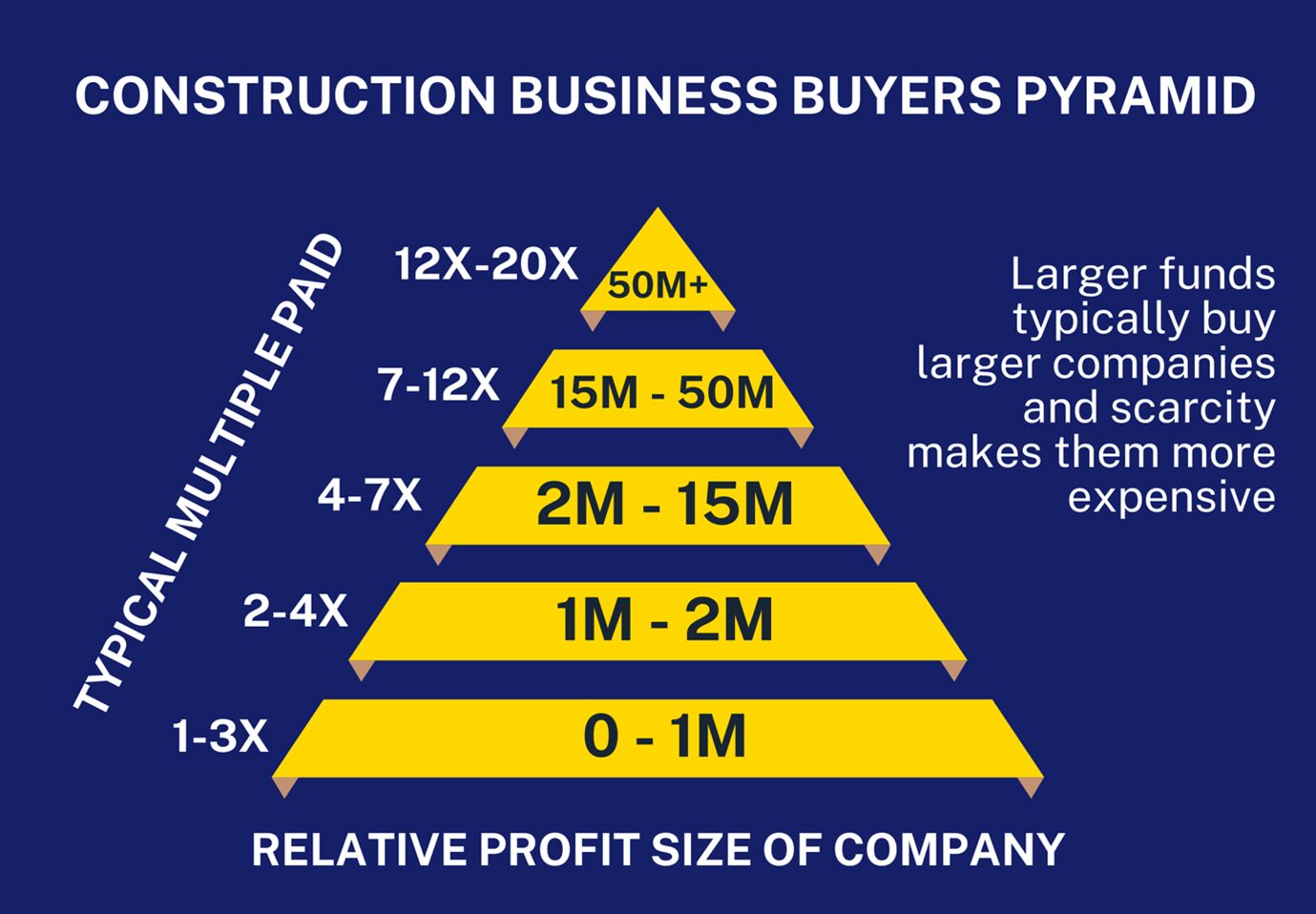Most business owners in the construction sector overvalue their companies, are you one of them? By Bradley Lay.

As an investor, I’ve acquired several businesses in the construction sector this year. From meeting with 400+ construction business owners since 2024, I’ve consistently been surprised by one thing: most just don’t know how to value or sell their company.
The guidance the masses follow is aimed at the wrong level of the market. M&A advisers, brokers and consultants often use frameworks built for large private equity firms, trade buyers and family offices.
Because of the inherent risks within the built environment sector, these buyers only get serious once a construction business is generating £2m+ in profit before tax (PBT). Below that amount, the rules change.
How to value your construction business
There’s no magic formula, but here’s a simple benchmark to use as a starting point when looking to acquire a business under £2m PBT:
1x-4x PBT
+ Assets
– Liabilities
+ Free cash
Factors that increase multiples:
• Solid pipeline of future work
• Low customer concentration
• Clean, consistent financial reporting
• Documented systems and processes
• Strong, stable second-tier management
• Recurring revenue or long-term contracts
• Minimal owner involvement day-to-day
Avoiding disappointment
If your construction business is under £2m PBT, then applying ‘big firm’ valuation multiples is only going to lead to disappointment.
The market for smaller acquisitions is limited, so buyers like myself in this space are laser-focused on risk, consistency and proof (not potential).
Larger, systemised businesses with strong profit history can demand higher multiples because they represent a lower risk and better ROI for an acquirer.
The smaller firms I come across are often too reliant on the owner, lack management depth, or have been built on volatile revenue.
This is why multiples shrink at the bottom of the market and why understanding how to push your business above that £2m line is so critical.
The diagram below illustrates how profit influences the amount buyers are prepared to pay for construction businesses.

Want to accelerate your value into the £2m+ PBT bracket?
Below are seven key areas that we buyers focus on during the valuation and due diligence stage of a potential acquisition. By having this insider knowledge, business owners and senior leaders can implement these seven strategies to immediately fast-track their business into the coveted £2m+ profit zone
1. Owner dependency
If the business can’t run without you, it’s not a sellable asset, it’s a job with overheads.
An owner of a roofing company I’m currently in talks to acquire, recently decided to take a three-month holiday to test if the business could operate without him. Initially, he saw that this was working. However, upon returning to the office, the business was in total chaos.
The owner has now realised that he is nowhere near ready to fully exit the business, which means if we do end up doing a deal, he’ll have to be tied in post-completion for at least three years.
2. Layer of senior management
Strong second-tier leadership gives buyers confidence that the business will perform after you’re gone.
When I acquired a cladding company, there were senior managers who the previous owners had prepared to take over the reins. These were for the managing director and commercial director roles, meaning the previous owners didn’t need to be tied into a three-year exit.
3. Standard processes and systems
Documented systems make a business scalable, repeatable and far more attractive to buyers.
The best example I have ever seen of this is a scaffolding company that was operating under a fully turnkey technology solution, which was truly groundbreaking.
The only problem was that the business owner believed his business should be classed as a technology company and was seeking a technology sector valuation.
In some cases, businesses in the tech sector can be valued at a multiple of revenue rather than profit. This company was way overvalued as a construction business.
4. Client concentration
No single client should account for more than 20% of revenue, as too much reliance kills value.
Buyers want risk spread, not concentrated risk. I met a utilities maintenance business last year that had absolutely incredible profits. Unfortunately, the huge red flag was that this was all generated from one single client. Way too risky for a buyer.
5. Forward contracts and order book
A strong pipeline of signed work adds value. But fluff, letters of intent and handshake deals just don’t count.
In one of our recent acquisitions in the cladding sector, we have built a £250m pipeline of opportunity over the next two years. That gives a buyer plenty of certainty.
6. Plant, equipment and land
Owned (not heavily financed) assets add to value and reduce perceived risk.
This is a considerable concern for piling and groundworks businesses, which are traditionally heavily asset-based, relying on expensive finance to fund these assets.
A groundworks business went into administration recently for this very reason.
7. Financial hygiene
Clean, consistent financials build confidence in a business. Poor reporting and financial control is one of the fastest deal killers.
When I’m meeting with a business owner, if it takes longer than a few weeks to receive the latest financials after signing an NDA, this is usually a sign that the owner does not have their finger on the pulse and raises a big red flag.
Avoid getting misled by the highest valuations meant for £2m+ PBT businesses. If you’re in the under £2m range, then focus on strengthening these fundamentals and scaling sensibly. Build a business that buyers will be lining up and competing with each other to acquire.
Bradley Lay is a global speaker, business investor and CFO. He is the founder of Peak Capital Group, a private equity firm specialising in acquiring and scaling construction businesses ready for high-value exits.











